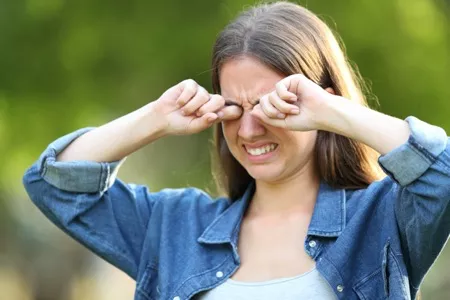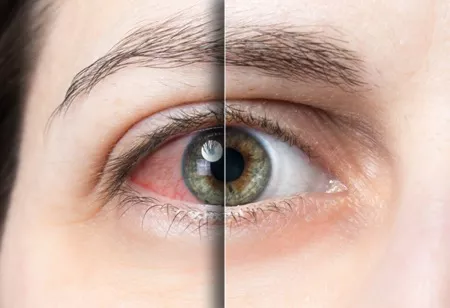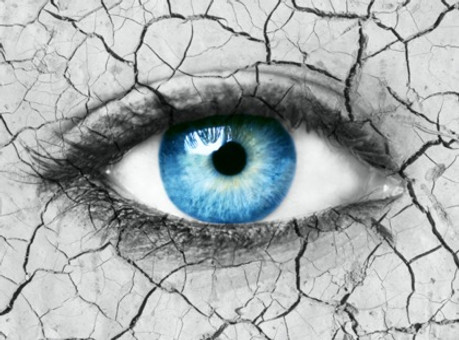As the winter approaches and the weather becomes more dry and cold, you may notice you are experiencing more frequent bouts of dry eye. Weather is just one of the factors that can irritate dry eyes in patients who already suffer from pain, redness, and discomfort
Dry eye or Dry Eye Syndrome (DES) is a common and frustrating condition that seems to appear out of nowhere, leaving sufferers scrambling to find relief. According to the American Academy of Ophthalmology, nearly 5 million Americans suffer from DES each year.
It is important to take steps to relieve your dry eyes. Don’t simply dismiss it as getting older or allergies. Ignoring the symptoms of dry eye can lead to even more serious eye conditions and possible vision loss.
To help you find relief for your dry eye, let’s review some of the most common causes and symptoms so you can find the right treatment and improve your visual comfort.
What Are Dry Eyes?

DES can leave patients rubbing their eyes in frustration as they try to find a way to soothe painful dry eyes. Dry eye occurs when the tear ducts are unable to produce the right level of moisture to maintain a balanced level in the eye.
Dry eyes can also be a result of a lack of tears caused by a malfunction in the tear film. Some patients may be able to produce some tears but not enough to provide relief. This is caused by clogs in the eye ducts, causing secondary eye issues such as chalazion which may require surgery.
Some patients may also experience dry eyes due to other eye health issues such as ocular rosacea, diabetes, sunburn, or macular degeneration.
What Are The Symptoms of Dry Eye?
DES symptoms can vary greatly from person to person. Some patients may only experience one or two symptoms depending on their eye health, while others may experience multiple symptoms leading to pain and discomfort.
The most common DES symptoms are:
- Dryness and redness
- Discomfort such as burning or stinging
- Gritty feeling in the eye
- Trouble driving at night
- Alternating between dry eyes and watery eyes
How Is DES Diagnosed?
If you think you are experiencing the symptoms of DES, then it is important to see an eye doctor who can do a comprehensive eye exam to determine the cause and treatment of your DES.
Your doctor will begin by reviewing your medical history to see if there is a family history of dry eye. This will help your eye doctor pinpoint the cause of your DES and determine if it is a result of other potential health issues such as diabetes or macular degeneration.
Your doctor will then perform an eye exam including all areas of the eye including:
- The exterior of the eye
- Eyelids
- Tear ducts
- Interior of the eye including the cornea and retina
- Tear film to determine if there is any damage or clogging
Once your doctor has completed the eye exam, they will also review lifestyle and medical factors that may be having an impact on your eye’s ability to produce tears.
This may include reviewing any medications you are taking such as beta-blockers or blood pressure pills to determine if this may be having an impact on your eye health. Other medications can also cause dry eyes such as sleeping pills, anxiety medication, and allergy pills.
Your doctor may also review your personal and work environment to see if there are any factors that may be affecting your eye health such as exposure to chemicals, smoke, or dry air.
Treatment Options For Dry Eyes
 Once your doctor has done a complete eye exam and evaluated your overall health, they will be able to provide you with treatment options to relieve your DES discomfort.
Once your doctor has done a complete eye exam and evaluated your overall health, they will be able to provide you with treatment options to relieve your DES discomfort.
If your DES is mild, then your doctor may prescribe either artificial tears to help with keeping your eyes moist and comfortable throughout the day. It is important to review your artificial tear options with your eye doctor as not all brands provide effective relief for dry eye symptoms.
If your dry eyes are caused by blocked tear ducts, then your eye care professional may recommend several treatment options to help with the production of tears including:
- Hot compresses on the eyes
- Massaging the tear ducts
- Special eye masks designed to help with the unclogging and production of oils in the eyes
Your eye care provider may also recommend lifestyle changes to improve your eye health and reduce the symptoms of dry eye. This can include changes in diet such as eating foods that improve eye health.
Other helpful lifestyle adjustments to consider are:
- Stop smoking
- Increase consumption of omega-3 fatty acid such as fish like salmon
- OTC artificial tears
- Reduce the amount of time spent using digital devices
- Anti-inflammatory drugs
COVID-19 Mask Wearing and Dry Eye
Have you noticed your eyes feeling drier over the last two years? It may be a result of wearing a mask. It is important to maintain proper COVID-19 protocols based on the advice of your region’s medical experts. This may include wearing a mask.
Wearing a mask not only protects you but also protects those around you from contracting COVID-19. But wearing a mask can have an effect on your eyes. Moisture from your breath gets pushed up into the eyes causing dryness. Masks rubbing against the eyelids and eye ducts can also cause discomfort and dryness.
Eye care professionals recommended wearing a mask that fits your face properly and does not rub against the eyes.
Take frequent breaks from wearing a mask when safe to do so to allow the eyes a chance to produce tears.
Replace masks frequently and maintain good mask hygiene:
- Wash cloth masks daily
- Dispose of paper masks after each use
- Wash your hands before touching your mask
- Do not share masks
Can Contact Lenses Cause Dry Eye?
Contact lenses are an effective treatment of vision loss, however, for some patients contact lenses can lead to dry eye. It is important to follow good contact lens hygiene to prevent discomfort when wearing contact lenses.
If you do not change your contact lenses at the designated intervals or do not maintain proper cleanliness, then you are twice as likely to experience dry eye and discomfort.
There are a number of recommended contact lens options specifically for dry eyes. These include Air Optix, Acuvue, and DAILIES. Talk to your eye care provider to see if changing the type of contact lenses you wear may be helpful in alleviating your dry eye.
Takeaway
Dry Eye Syndrome can be frustrating, but with the help of your eye care professional, you can experience effective relief. By following recommended treatment protocols and wearing the right vision correction devices such as contact lenses for dry eye, you can experience a significant improvement in your DES symptoms.
Web Eye Care has a large selection of glasses and contact lenses to help provide you with relief from DES. If you are interested in learning more about which vision correction is right for you, contact us in the chatbox or send us a message.
 Save yourself from getting into rush hours and buy your contacts online.
Save yourself from getting into rush hours and buy your contacts online.







